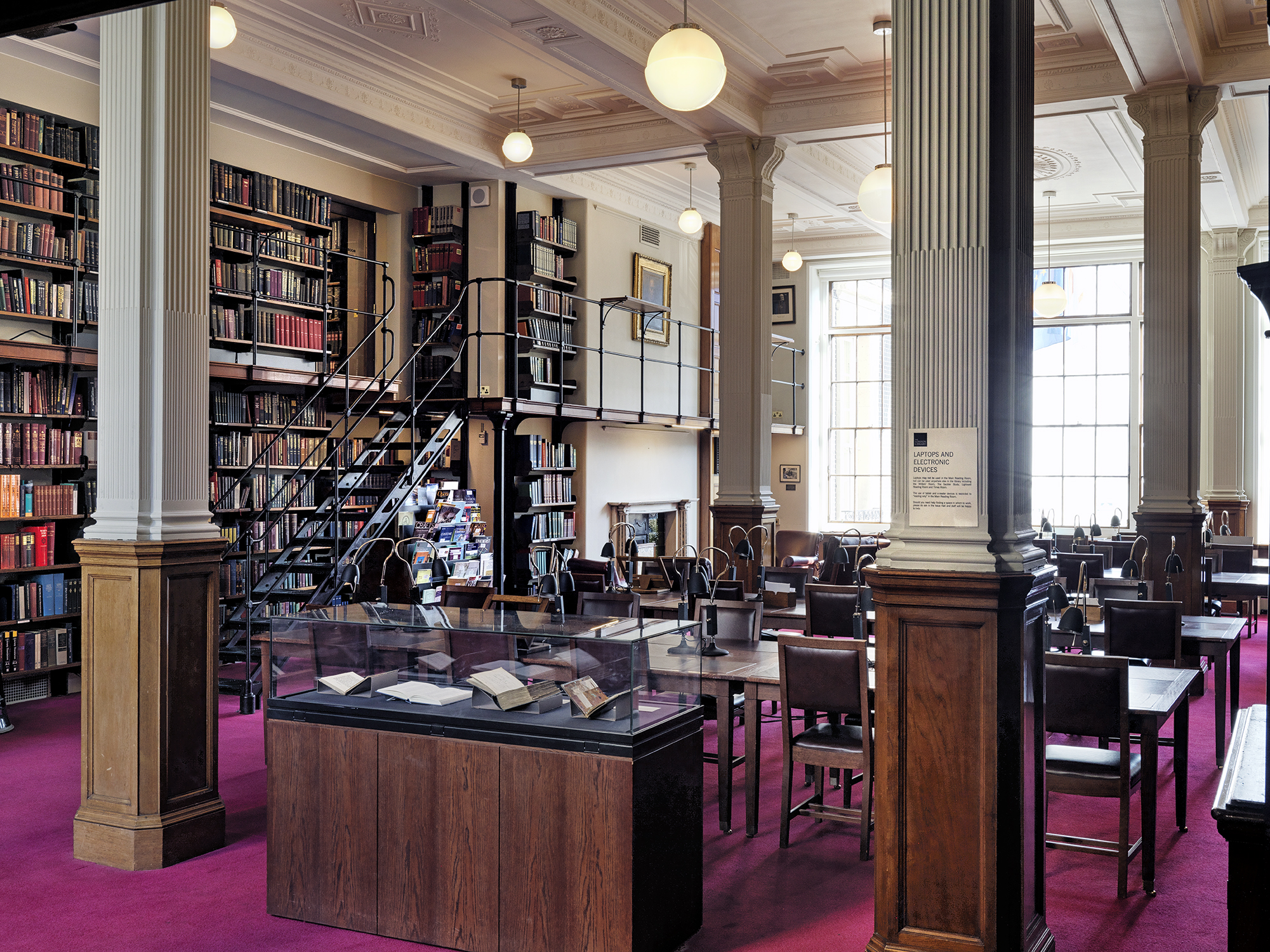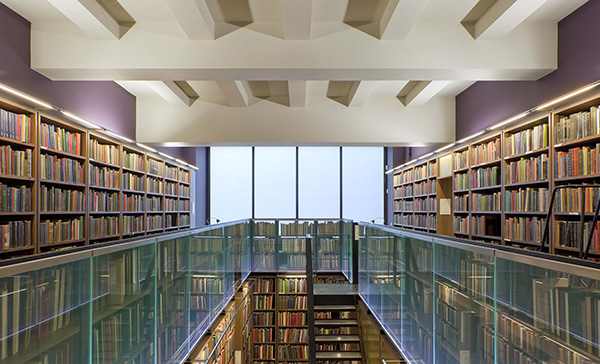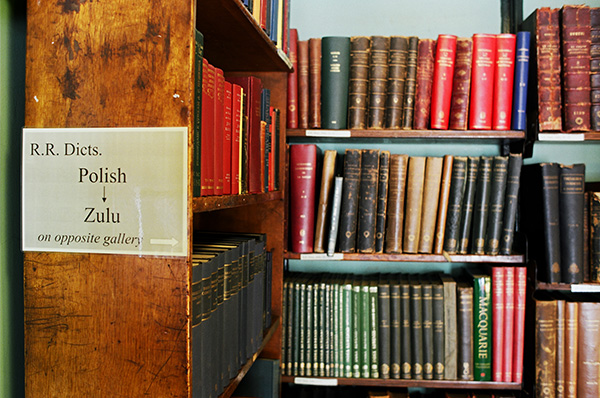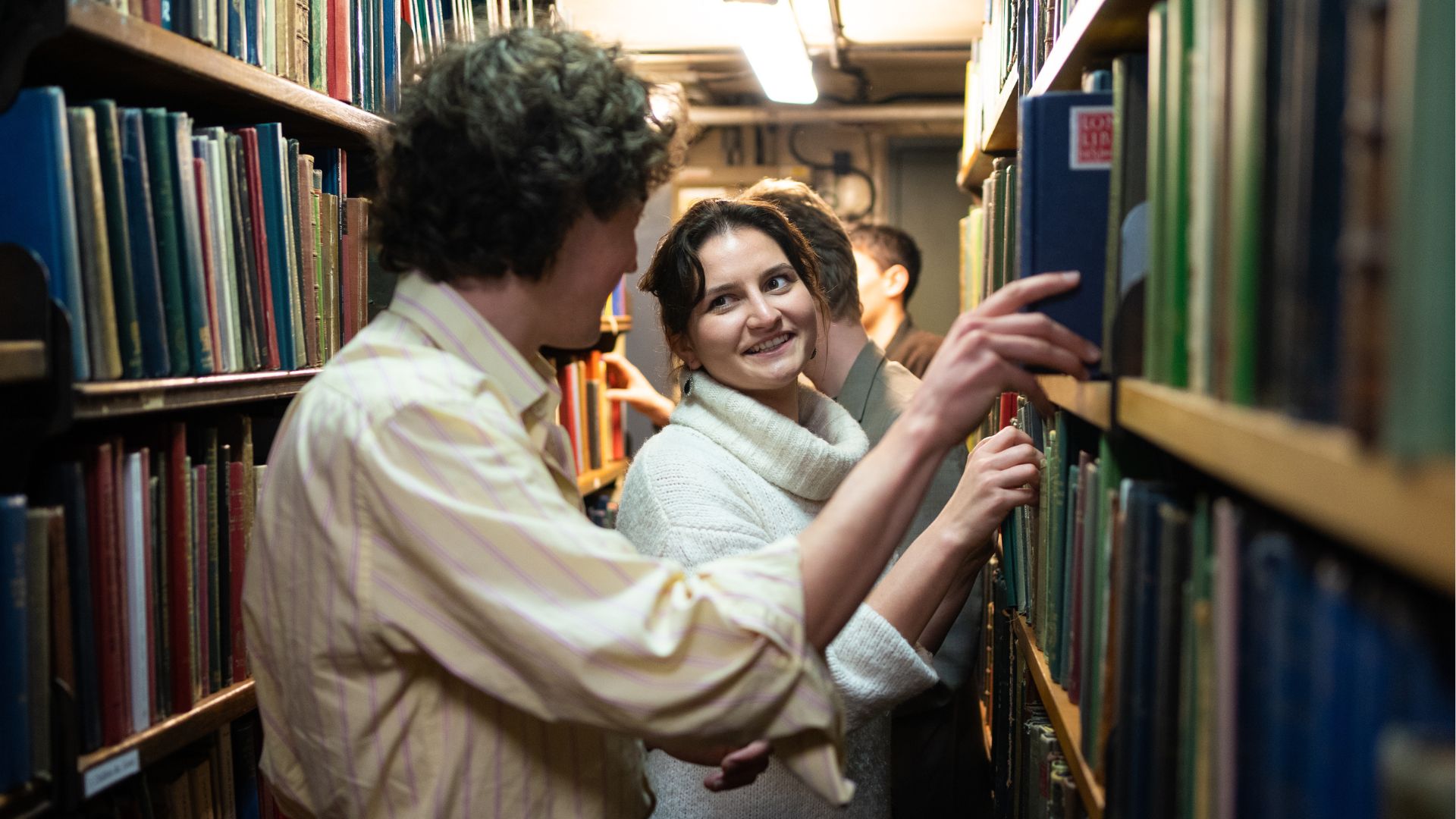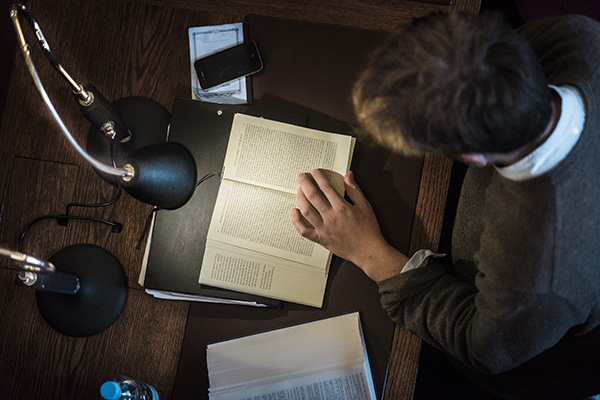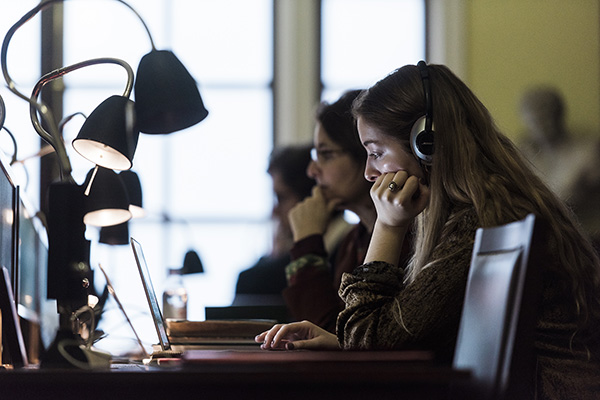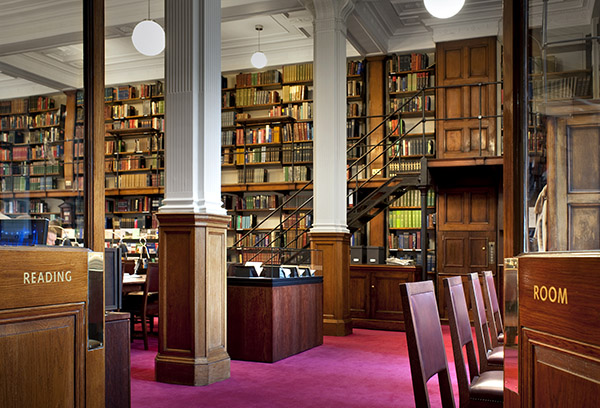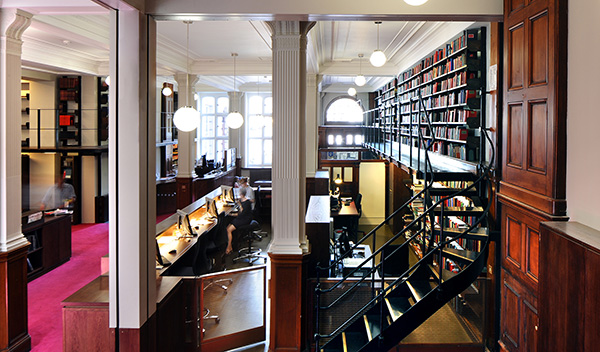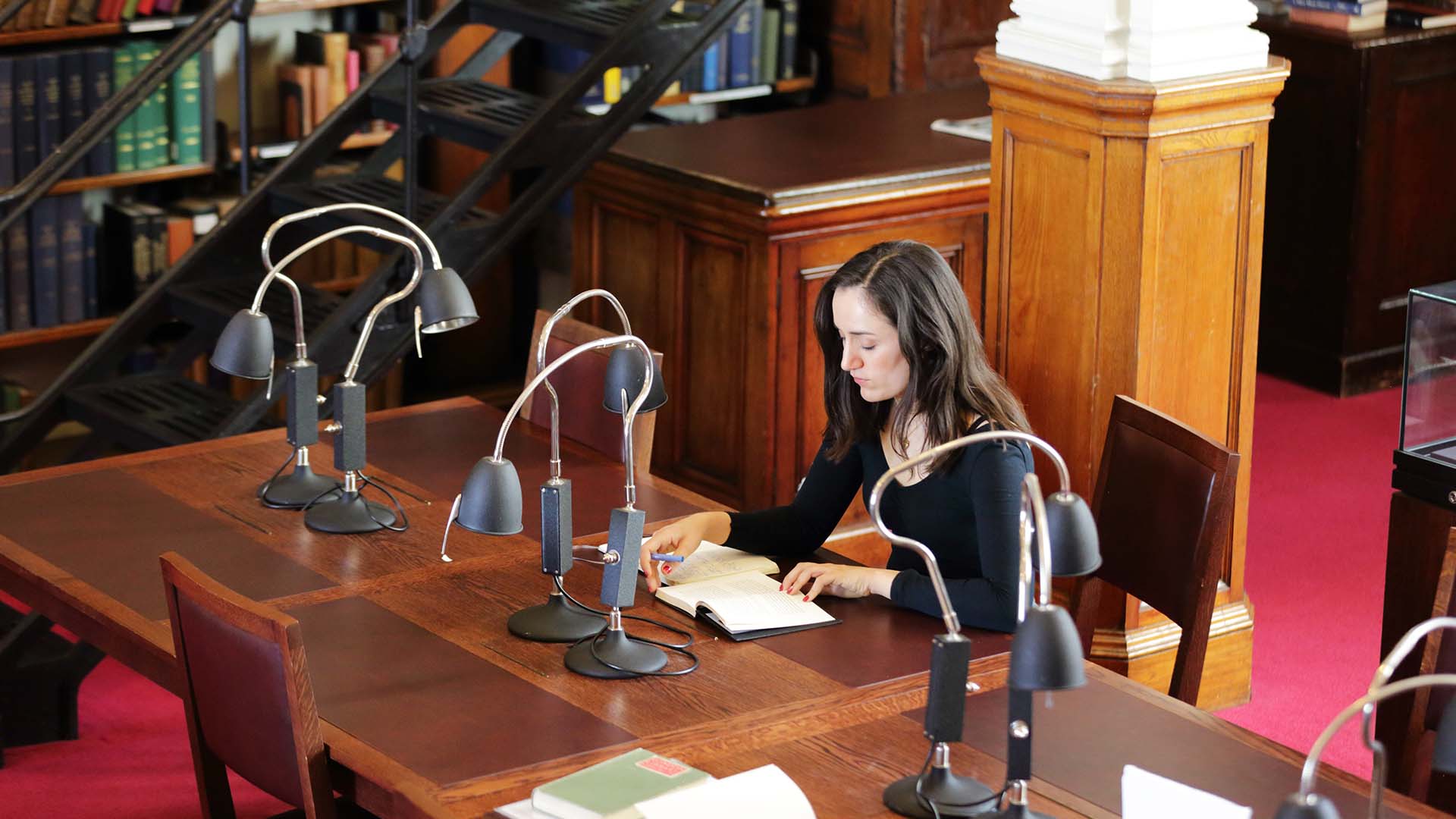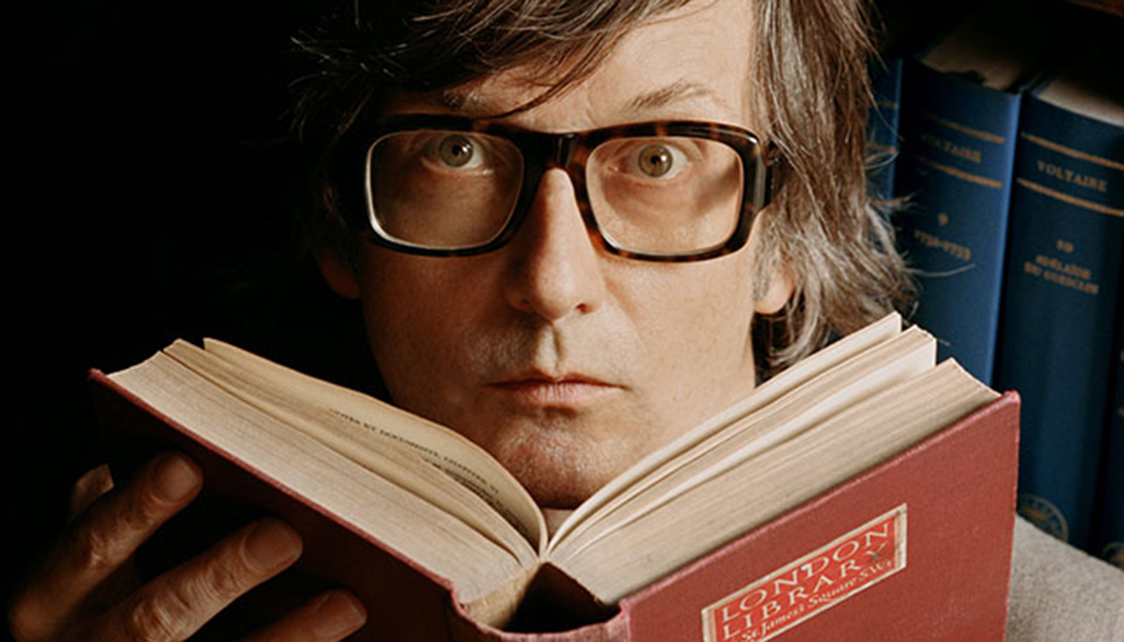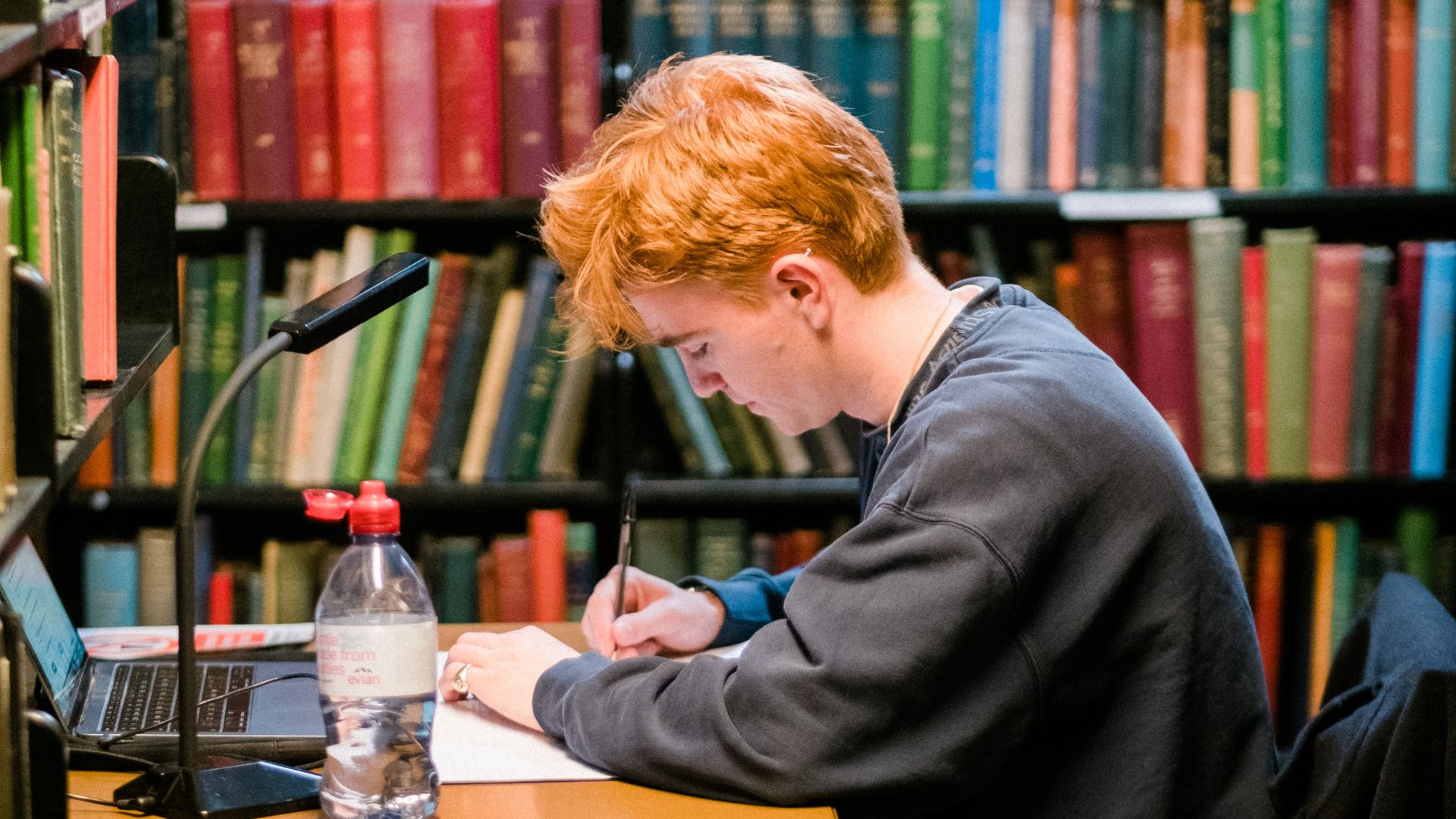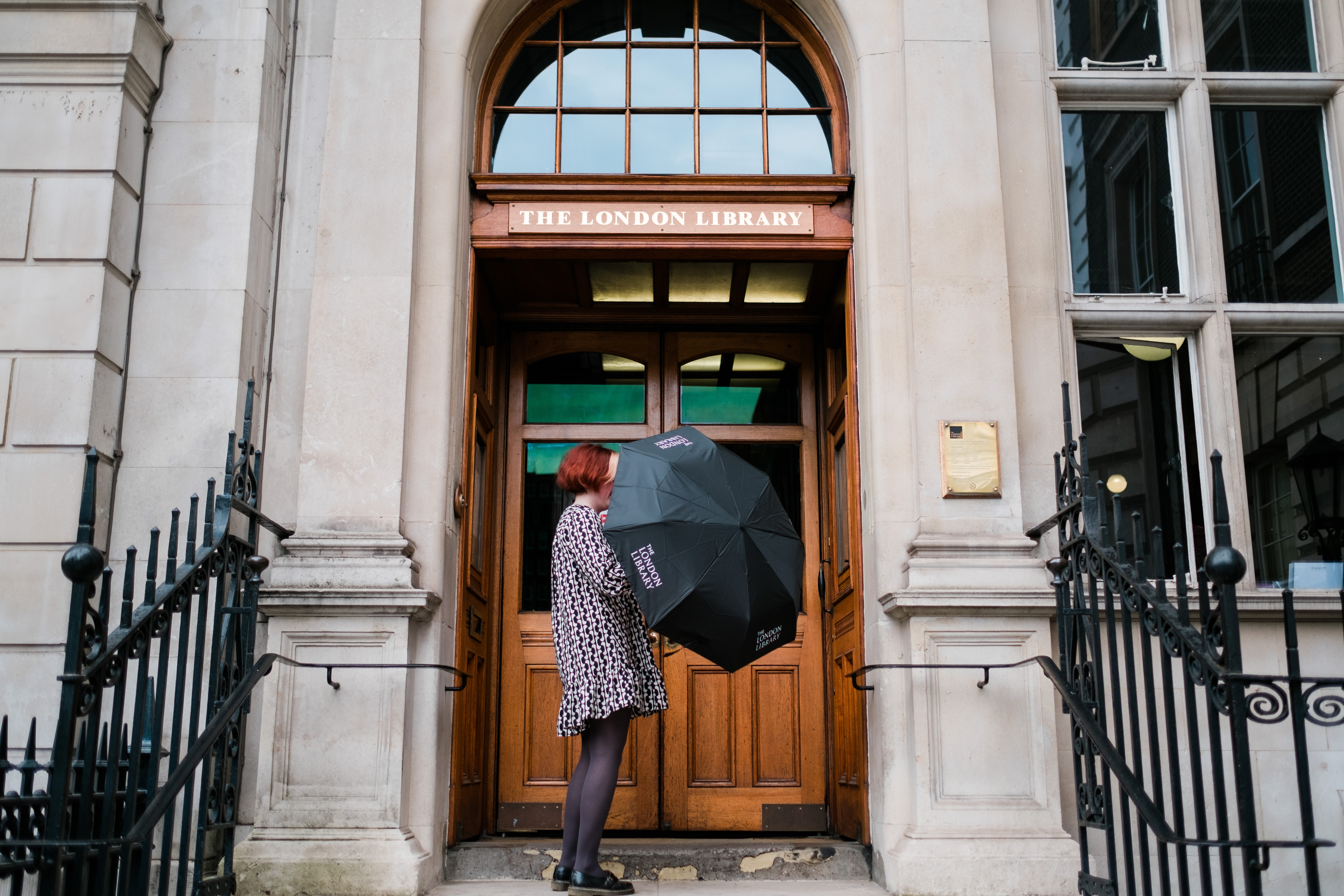Thank you for booking for The London Library. Please read these guidelines before you come to the event.
- Please do not arrive at the Library before the advertised doors opening time as you will not be able to enter the building.
- You do not need to print your ticket. Please just give your name to Library staff on reception as you come in.
- For most public speaker events drinks will be served in the Issue Hall prior to the event and doors to the Reading Room will open five minutes before the talk begins. For book launches, salons, prize announcements and parties, the bar will be in the Reading Room. When relevant, books will be on sale either in the Issue Hall or Reading Room before and after the event.
- If you need step-free access, please let us know at This email address is being protected from spambots. You need JavaScript enabled to view it. and enter via the Masons Yard entrance in the eastern corner of Masons Yard. The Reading Room is accessible via the lift, as are the disabled toilets in the basement. Please let us know if you are in a wheelchair and we will reserve a space for you.
- The health of our visitors and staff remains our top priority, and we’ll continue to keep procedures in place to ensure your visit is as safe as possible. This includes hand sanitiser points and ventilation throughout the building.
- All events take place in our Reading Room, which will be well ventilated throughout events with large windows open on both sides of the room. Please be aware that this can sometimes mean the room is a little cool.
- Please do not attend if you have Covid symptoms or have had a positive Covid test. Where relevant in these circumstances, we’re happy to provide a refund – please just get in touch 24 hours before the event on This email address is being protected from spambots. You need JavaScript enabled to view it.
We’re looking forward to welcoming you to The London Library.
The London Library will be closed throughout the Bank Holiday Weekend Saturday 28 – Monday 30 August inclusive. We’ll be open for business as usual from 10am on Tuesday 31 August.
Although the building will be closed during this period our extensive online resources will be fully available, with Catalyst enabling you to search and return results from all of our print holdings and 95% of our electronic resources, including articles from electronic journals.
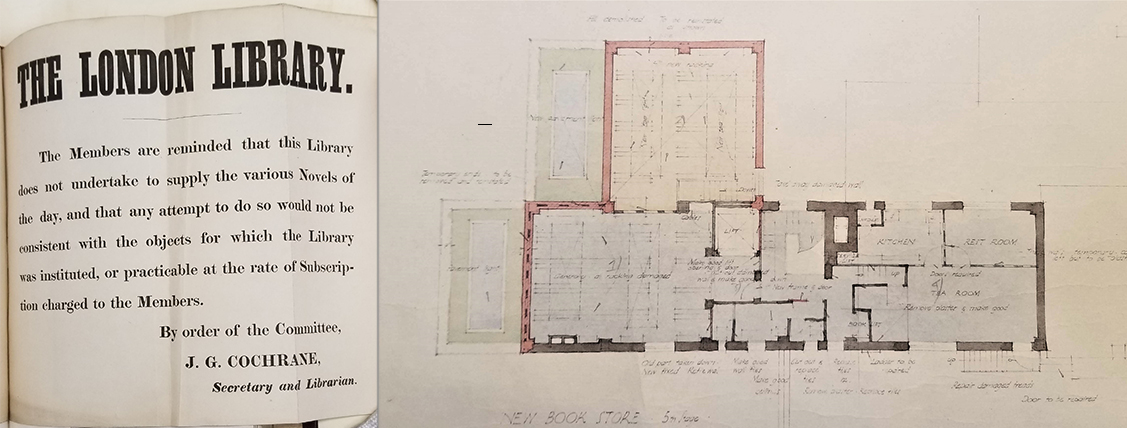
(L: Note to Library member, J.G. Cochrane, first Secretary and Librarian of the London Library ca. 1845. Library Artefacts, SJS Basement Store, Shelf 4; R: Plan showing bomb damage to the Library)
The London Library Archive collects, preserves and maintains the Library's archival collections and manages member enquiries and access to the materials. The Archive is made up of all working papers, artefacts and ephemera created by the Library from its inception to the present.
With over 1800 items, the Archive contains correspondence, membership forms, minutes, property deeds, building plans, manuscripts and audio-visual materials that speak to the heart of the Library, its members and staff from its founding in 1841. The Library’s Archivist is Nathalie Belkin.
Working closely with Collection Care, the Archivist preserves the collections by implementing archival standards for cataloguing, preservation, housing and storage. The Archivist manages copyright, permissions, licensing and reproduction of its materials for use by researchers.
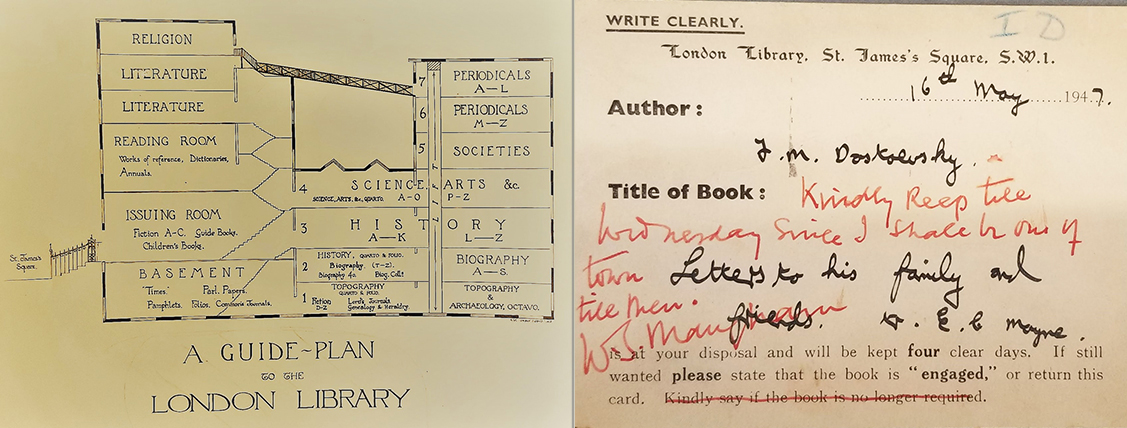
(L: Plan of The London Library; R: Request from W. Somerset Maugham to hold a specific book for him. Issue Books, SJS Basement Storage, Box 39)
View archival documents
The London Library conducts invigilations by appointment with 72-hours’ notice. To set up an appointment or for any research enquiries, please email This email address is being protected from spambots. You need JavaScript enabled to view it.
Two London Library members, Jules Lubbock and Marina Warner, invited others to pay tribute to London Library staff who have worked over the last year to keep the Library accessible through postal loans and other means.
Read their anecdotes below:
"I’ve been exploring storytelling methods in the past - balladeers, strolling players, and story machines – random generators of tales – towards a show next year at the Hayward which I hope will draw attention to the importance of play and story-making, especially in times of displacement and loss of home. My friend Pippa Lewis, another devotee of the London Library, reminded me of the clowning, puppetry, and street theatre of Dario Fo, who won the Nobel for Literature in 1997. I called up one or two of the Library’s holdings on his work, which looked promising. The books arrived: one of them a massive album, an obscure, splendid Italian publication, nearly 500 weighty pages, a real pave as the French call such tomes. It must have been a very expensive parcel– and the Librarians had sent it to me during lockdown without demur."
- Marina Warner
--
"During the winter lockdown I needed a somewhat esoteric volume: Aquinas's Latin commentary of c.1270 on the 1250 Latin translation of Aristotle's Politics in a 1951 edition. Aristotle had stated that people may become divorced from law and justice resulting in the breakdown of the state and the savagery of civil war. Aquinas responded by claiming that the state could be restored to health through the reimposition of justice and political order. I simply wanted to check Aquinas's precise wording in which he observed that in Aristotle's Greek text he used the same word, diki, for both civic order and for justice. The Warburg Institute Library, which was closed, did not have a copy of the book; the British Library did have a copy but was also closed. A copy could be purchased but for about £20, and there was no text available online. But the London Library, as so often, did have a copy, which I ordered and which duly arrived in the post a few days later."
- Jules Lubbock

Read the submissions:
"Perhaps more a thank you than an anecdote. I came into the library in the last hour before the lockdown, realising that there was going to be a problem accessing books for the next month or two (little did we know how long it would actually be, of course). The subject I was researching was an Arts and Crafts bicycle shed designed by the notable architect M.H. Baillie Scott. I grabbed literally everything that might be relevant from the shelves and took a big pile down to the issue desk. The staff member looked me in the eye and said 'This is more books than your limit'. I asked if the Library was about to close and he said that from what he could hear of a whispered conversation behind him, 'Yes, at any moment'. He then proceeded to check out every single book for me. This proved the salvation of my research and I am incredibly grateful. The fruits will be an article to be published in Garden History in the near future, having won the Gardens Trust's Mavis Batey Essay Prize. Thank you to all your marvellous staff for supporting us so well."
- Anthony Davis
--
"My entire experience with the London Library has been during lockdown. Back in mid-2020, I was gifted a year membership by Jessie Burton, author and member, as part of a competition she ran for aspiring authors to enable their research.
I’ve been working on my debut novel about homecomings and Cornish folklore over the past year and a half, and the library has been instrumental in my work. I needed help finding books to research a variety of topics—from the ecology and social history of Bodmin Moor to some specific Cornish folklore— so emailed in. James then replied with an incredibly detailed list of books, articles and essays to cover all my bases. The six books I was sent through the library’s postal service were old, beautiful and rare. The research shaped the rest of my novel, and the finished book has now been longlisted for an emerging writers award. This couldn’t have happened without the support and service that the library provides, and I’m so grateful to be a member."
- Jodie Matthews
--
"Had it not been for COVID I would never have joined the London Library!
In the weeks before lockdown we were told to wash our hands thoroughly and for good measure to sing Ring-a-ring o’roses several times as we did so. It’s the one nursery rhyme we all think we know the origin of. How did this rhyme first emerge? Was it really inspired by the Great Plague or the Black Death? If so why did this link only happen in the 1950s? Consulting the dictionary of nursery rhymes put together by Peter and Iona Opie one finds a completely different and continental origin. Thanks to the London Library I have unearthed a plausible explanation as to how the plague theory emerged. Unwittingly it could have been inspired in January 1949 by an R.A. Henderson of Lushington Road, Eastbourne. If anyone knows who he was please let me know.
When lockdown came – my wife forbade me from stepping outside the house. So to stop myself becoming bored and rampaging around our tiny garden, I decided to apply my theory of investigating the first known lines to Humpty Dumpty and found he was not Richard III or even a cannon in the Civil War. The Cat and the Fiddle was not Catherine Fidelis, long suffering first wife of Henry VIII. The ‘fine lady’ was not the first person to ride a cock-horse to Banbury Cross. And - the biggest shock of all - Jack and Jill were not two heterosexual lovers! Just look at the etching above the lines as they first emerged circa 1765.
Each week of ‘imprisonment’ I worked as a nursery rhyme detective on a new ‘corpse’. By the time lockdown ended I had consulted more than two dozen books, surfed the internet extensively and used my ex-journalistic skills to unravel the likely origins of 30 of our most loved nursery rhymes using a method which I don’t think has been used so strictly before. There were a whole lot of references and sources to check. A friend recommended I join the London Library. So a month or so ago I did.
With an introductory chapter about how nursery and Mother Goose rhymes first came to be collected and a closing chapter showing how they live on in novels, plays, cartoons, songs and statues etc I have a potential book running to some 200 pages. I’m hoping to find a publisher. But if don’t, I will publish it myself and give a copy to the London Library. It’s the least I can do!"
- Tim Devlin
--
"The first lockdown found me halfway through maternity leave. People often recommend that new mothers practise self care: massages, yoga, sleep. For me, wandering the Back Stacks on weekends was self care.
Suddenly, the library had to close. Instead of reading I was scrolling the internet for all things Covid-19. Life was overshadowed by worry: shops were running out of formula, appointments were being cancelled indefinitely, childcare options vanished. Everything shrunk overnight.
The library’s postal service turned out to be a lifeline. I could once again wander the Back Stacks, this time in the dead of night and virtually. I started modestly, searching for some work-related books I had been meaning to borrow before lockdown. As the nights progressed, that little search box turned into something of a confessional: motherhood, uncertainty… plague. It was all there, the human experience of it. The names on my virtual library card had been here too.
The ebb and flow of life with a young baby took over until a carefully wrapped package in the hall took me by surprise: “BOOKS, handle with care”. They’d done it! My virtual wonderings had been made real, a wish granted. It was a moment of pure joy, a piece of home when my own home increasingly did not resemble one.
I devoured the books; every page a break in the storm. One of them was Defoe’s A journal of the plague year, I wondered whether the person packing it had given a wry smile. I thought about them in that big hall. Reading obscure books about plagues past felt almost illicit, like peeking at the last page of a new novel first. It was going to be all right. Pandemics pass, life goes on and, through the ages, there are always the helpers, the helpers whose dedication makes all the difference at a difficult time, among them are the wonderful staff at the London Library."
- Vera Owen
--
"I am currently writing a history of the Theatre Royal, Haymarket, which celebrated its 300th birthday last year (this year is the 200th birthday of the present building.) I knew that this would entail a long slog through the eleven-volume series of books The London Stage 1660-1800 which records every performance at every theatre in London over the period. These are hefty volumes, and not the sort of thing you would read on the train or sitting up in bed. You need to be at your desk and in front of a screen. With all activities shut down, it seemed the perfect time to start, and, in spite of the postage and despatch issues involved in sending out big books, they all arrived within a few days of my asking for them. The result is that I am now much further into my book than I expected to be at this time.
Being able to borrow other books such as the excellent biographies of Samuel Foote and Binkie Beaumont, by Ian Kelly and Richard Huggett respectively, enabled me to make a LGBTQ link across the centuries in the Haymarket auditorium. In 1776 Samuel Foote was involved in a gay sex scandal when he was due to open in a play at the Haymarket. In 1953 John Gielgud found himself in the same position. Both were terrified of a hostile audience response but felt they had no alternative but to go ahead. Gielgud was so paralysed with fear that he couldn't walk onto the stage and had to be led on by Sybil Thorndike saying: 'Come along, John, they won't boo me.' In both cases they were giving a rapturous reception. 'There is not in the world perhaps an audience so humane and liberal-minded as an audience collected in an English theatre' wrote a journalist in 1776, and it was still true in 1953. People are often better than we think."
- Robert Whelan
--
"Thank you to all those who carried on going to work at the Lon Lib to despatch books. Particular thanks to Simon, James, Kimberley and Michael, for fast, helpful and – in one case – very funny emails in reply to book requests. Thanks to Matthew for double-checking when I’d mistakenly asked for the audiobook version of a text on Overdrive.
On a practical note to the postage team, the return labels enclosed with each parcel also made for a very handy temporary bookmark. In a solitary lockdown amidst work, (and amongst many other books), Jan Morris’s A Writer’s World was escapist travel and memories by proxy, Wilde’s De Profundis struck a chord, and Clive James’s autobiographies kept me sane whilst chuckling aloud, to and by, myself. Thank you all."
- Rachel Loryman
--
"In the winter lockdown, early 2021, I was isolating in a house on the seafront in Broadstairs, Kent. Stuck inside, out of boredom I ‘googled' the address, and a letter from Thomas Henry Huxley (1825-1895) appeared to have been sent from the same house, stating what an excellent place it was for him to finish a book for publication. With further research I ordered his book, the first he completed, from the London Library and this very large and wonderfuly illustrated publication arrived.
The oceanic hydrozoa: a description of the calycophoridæ and physophoridæ observed during the voyage of H.M.S " Rattlesnake" in the years 1846-1850: with a general introduction, London: Printed for the Ray Society,1849
I didn’t understand it as such, just enjoyed the imagery and gazing at the sea, imagining Huxley in the same room. I read his memoirs, also ordered from the library and truly soaked up the nineteenth century in this house built 1790."
- Susan Gamble
--
"I researched much of my first narrative non-fiction book, Windswept: Walking in the Footsteps of Remarkable Women, at the London Library. Although I’d finished it by lockdown, I hadn’t expected my American editors to be quite so particular about the footnotes. My footnotes were rough-ish, I hadn’t always taken down the exact page, or the exact reprint date of the book I was working from. Sometimes I used two translations of the same book, picking my quotes according to what sounded right for my book. My UK editor (John Murray) wasn’t worried about this and pointed out that I was writing blended memoir and non-fiction that was supposed to be accessible rather than academic. So far so good.
But all this changed when my American editor (from a different publisher) saw my ‘relaxed’ footnotes. I was already late to deliver because of the unexpected death of my father and because of Covid – the combination of which meant that I was a month behind schedule. I tried to explain that because of Covid I couldn’t get to the London Library (now closed) to double check the hundreds of pages, editions and translations that my American editor wanted. I explained that the library was renowned for its esoteric collection – much of which couldn’t be found online. This wasn’t what they wanted to hear, so after several desperate emails and calls to the library, one of the librarians agreed to trawl through several obscure books looking for the quotes for which I had no page numbers. Cursing myself for not having taken better notes, I emailed the quotes and any other useful information I had (which was sometimes as vague as ‘in the middle somewhere’) and a very kind and patient librarian went to the library, found my page-less quotes and supplied me with the page number, or the missing publication date.
Everything was completed so close to the wire there wasn’t time for me to update the Acknowledgements in order to fully recognise the extraordinary efforts of the London library. So, London Library – I salute you!"
- Annabel Abbs
--
"We were loyal members of the British Library which I had been using since the days of my PhD. We were bereft when it had to shut its doors during lockdown. There was great excitement when it reopened – but – numbers were limited and it was necessary to book online. The first day that slots became available the website crashed – and it became a lottery every Thursday when new seats were made available, and when they were – they were time limited, you could not choose your own seat and your favourite reading room was often fully booked. And – the buzz had gone.
We were bewailing our unhappy state to a friend in the safe outside space of the Russell Square café. He had been given life membership of the London Library by his parents (what a present!) and quietly recommended it. We knew of the London Library, but had always felt it to be an extravagance when we had access to the British Library. As there were two of us it was not as much of an extravagance as we had first thought and so we made our way to St James’ Square and joined up [on a Spouse/Partner Membership]. Throughout most of lockdown, the Reading Room became our haven. I finished writing a book and proof read the corrections there, and we both found it extraordinary that you could wander the stacks, pull out any book that was of interest and take it home. I did get lost on my first day in the Literature section, and had to find a staff member to refind my seat near Henry James. The cataloguing system threw up the most unlikely synchronicities and stimulated new ideas and connections. I joined the women’s reading group on line and had a lively discussion about Virginia Woolf, we went to the online Christmas party with our friend (and did creditably, but not brilliantly, in the quiz). You did have to book, but the website did not crash and the cheerful reception staff were reassuring that there was always a space somewhere. The London Library and its staff meant that work could go on.
The British Library no longer has to be booked, and you now largely have access to your favourite seat and reading room. The pleasures of the London Library cannot however be easily given up and so – it is with great gratitude that we are now loyal members of both."
- Deborah



